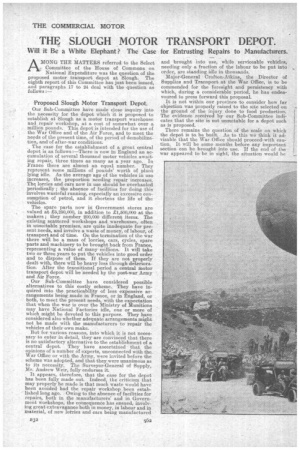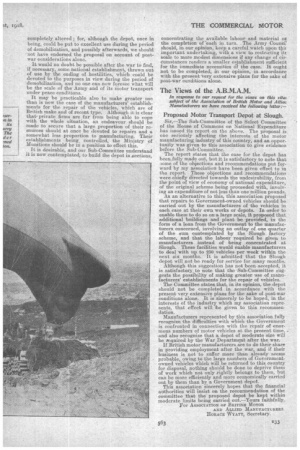nig SLOUGH MOTOR TRANSPORT DEPOT. Will it Be a White Elephant ? The Case for Entrusting Repairs to Manufacturers.
Page 12

Page 13

If you've noticed an error in this article please click here to report it so we can fix it.
AMONG THE MATTERS referred to the Select . Committee of the house of Commons on National Expenditure was the question of the proposed motor transport depot at Slough. The eighth report of this Committee has just been issued, and paragraphs 17 to 24 deal with the question as follows :
Proposed Slough Motor Transport Depot.
Our Sub-Committee have made close inquiry into the necessity for the depot which it is proposed to establish at Slough as a motor transport warehouse and repair workshop, at a cost of somewhat over a. million pounds.. This depot is intended for the use of the War Office and of the Air Force, and to meet the needs of the present time, of the period of demobilization, and of after-war conditions.
. The ease for the establishment of a great central depot is as follows :—There is now in England an accumulation of several thousand motor vehicles awaiting repair, three times as many as a year ago. In 'France there are almost an equal number. They represent some millions of pounds' worth of plant lying idle. As the average age of the vehicles in use increases, the proportion needing repair increases. The lorries and cars now in use should be overhauled periodically ; the absence of facilities for doing this involves wasteful running, especially an excessive consumption of petrol, and it shortens the life of the vehicles.
The spare parts now in Government stores are valued at £5,250,000, in addition to £1,500,000 at the makers ; they number 200,000 different items. The existing scattered workshops and warehouses, often in unsuitable premises, are quite inadequate for present needs, and involve a waste of money, of labour, oftransport and of time. On the termination of the war there will be a mass of lorries, cars, cycles, spare Tarts and machinery to be brought back from France,
• representing a value of many millions. It will take two or three years to put the vehicles into good order and to dispose of them. If they are not properly dealt with, there will be heavy loss through deterioration. After the transitional period a central Motor transport depot will be 'needed by the post-war Army and Air Force.
Our. Sub-Committee have considered possible alternatives to this costly scheme.. They have inquired into the practicability of less. expensive arrangements being made in France, or in England, or both, to meet the present needs, with the expectation that when the war is over the Ministry of Munitions may have National Factories idle, one or more of which might be devoted to this purpose. They have considered also whether adequate arrangements might not be made with the manufacturers to repair the vehicles of their own make.
But for various, reasons into which it is not necessary to enter in detail, they are convinced that there is no satisfactory alternative to the establishment of a central depot.. They have ascertained that the opinions of a number of experts, unconnected with the War Office or with the Army, were invited before the scheme was adopted, and that they were unanimous as to its necessity. The Surveyor-General of Supply, Mr. Andrew Weir, fully endorses it.
It appears, therefore, that the case for the depot has been fully made out. Indeed, the criticism that may properly be made is that much waste would have been avoided had the repair workshop been established long ago. Owing to the absence of facilities for repairs, both in the manufacturers' and in Government workshops, the consequence has ensued, involving great extravagance both in money, in labour and in material, of new lotries and cars being manufactured B32 562
and brought into use, while serviceable vehicles, needing only a fraction of the labour to be put into order, are standing idle in thousands.
Major-General Crofton-Atkins the Director of Supplies and Transport at the i'ar Office, is to be commended for the foresight and persistency with which, during a considerable period, he has endeavoured to press forward this proposal.
It is not within our province to consider how far objection was properly raised to the site selected on. the ground of the injury done to food production. The evidence received by our Sub-Committee indicates that the site is not unsuitable for a depot such as is proposed.
There remains the question of the scale on which the depot is to be built. As to this we think it advisable that the War Office should proceed' with caution. It will be some months before any important section can be brought into use. If the end of the war appeared to be in sight, the situation would be completely altered ; for, although the depot, once in being, could be put to excellent use dining the period of demobilization, and possibly afterwards, we should not have endorsed the proposal on account of postwar considerations alone.
It would no doubt be possible after the warto find, . if necessary, some national establishment, thrown out of use by the ending of hostilities, which could be devoted to the purposes in view during the period of demobilization, and no one can now foresee what will be the scale of the Army and of its Motor transport under peace conditions.
It may be practicable also to make greater use than is now the case of the manufacturers' establishments for the repair of the vehicles, which are of British make and of recent type. Although it is clear that private firms are far from being able to cope with the whole situation, an endeavour should be made to secure that a large proportion of their resources should at once be devoted to repairs and a somewhat less proportion to manufacturing. Their establishments being, controlled, the Ministry of Munitions should be in a position to effect this. It is desirable, and our Sub-Committee understand it is now contemplated, to build the depot in „sections, concentrating the available labour and material or the completion of 'each in turn. The Army Conner should, in our opinion, keep a careful watch upon thit important undertaking, with a view to restricting it scale to more modest dimensions if any change of circumstances renders a smaller establishment sufficient for the immediate necessities of the case. It ought not to be completed, in our opinion, in accordance with the present Very extensive plans for the sake of post-war conditions alone.
The Views of' the A.B.M.A.M.
in response to our request for the views on this vitai subject of the Association of British Motor and Attlee Manufacturers we have received the following letter:— Proposed Motor Transport Depot at Slough.
Sir,—The Sub-Committee of the Select Committee of the House of Commons on National Expenditure has issued its report on the above. The proposal is one seriously affecting the interests of the motor manufacturing industry of this country, and an oppor tunity was given to this association to give evidence before the Sub-Committee.
The report states that the case for the depot has been fully made out, but it is satisfactory to note that :iome of the objections and recommendations put forward by my association have been given effect -to in the report. These objections and recommendations were chiefly directed towards the undesirability, from the point of view of economy of national expenditure, of the original scheme being proceeded with, involving an expenditure of not less than one million pounds.
As an alternative to this, this association proposed that repairs to Government-owned vehicles should be carried out by the manufacturers of the vehicles in each case at their own works or depots. In order to enable them to do so on a large scale, it proposed that additional buildings and plant be provided, in the form of a loan from the Government to the manufacturers concerned, involving an outlay of one quarter of the sum contemplated by the Slough factory scheme, and that the labour required be given to manufacturers instead of being concentrated at Slough. These facilities would enable manufacturers to deal with up to 250 vehicles per week within the next six months. It is admitted that the Slough depot will not be ready for service for many months.
Although this suggestion has not been,a,ccepted, it is satisfactory to note that the Sub-Committee suggests the possibility of making greater use of manufacturers' establishments for the repair of vehicles.
The Committee states tliat, in its opinion, the depot should not be completed in accordance with the present very extensive plans for the sake of post-war conditions alone. It is sincerely to be hoped, in the interests of the industry which my association represents, that effect will be given to this recommendation.
Manufacturers represented by this association fully recognize the difficulties with which the Government is confronted in connection with the repair of enormous numbers of motor vehicles at the present time, and also recognize that a depot of moderato size will be :le-quired by the War Department after the war. If British motor manufacturers are to do their share in providing employment after the war, and if their business is not to suffer more than already seems probable, owing to the large numbers of Governmentowned vehicles which will be returned to this country for disposal, nothing should be done to deprive them of work which not only rightly belongs to them, but can be more efficiently and more economically carried out by them than by a Government depot. This association sincerely hopes that the financial authorities will insist on the recommendation of the committee that the proposed depot be kept within moderate limits being carried out.—'ours faithfully,
For ASSOCIATION or ERITISR MOTOR AND ALLIED MANUFACTURERS HORACE WYATT, Secretary.






















